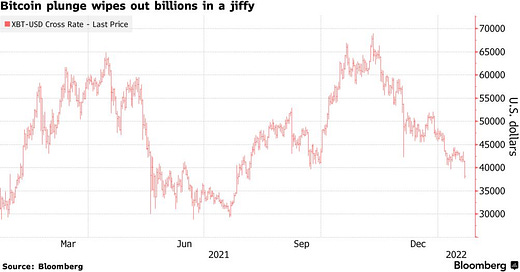I recognize that I haven’t posted in a while. Since my last article, a lot has happened in the crypto universe - Celsius and Voyager bankruptcy, 3AC blow-up (and the subsequent drama around it), insider trading at Coinbase, and so on. No, I didn’t lose my faith in crypto or walk away because numbers going down made me depressed. I was actually up to something a little more personal:
In June of this year, I started my first job out of college. The work is stressful and the hours are long, but I am absolutely loving it. I work at a place where I could have not imagined myself 5 years ago, and I am beyond grateful to be able to do it. More importantly, and perhaps more relevant to my readers, I am more excited about crypto than I have ever been before, even through this bear market.
Why?
A few reasons:
What we are going through, in my opinion, is a defining moment for crypto. For crypto to become a sustainable asset class, it must learn to survive through both good and bad economic cycles. Since the inception of Bitcoin post-2008, most of the developed world has been in a low-interest rate environment with a dovish Central Bank in the realm. Hate to burst the bubble, but the past 10 years are not reality, and it probably isn’t what the next 10 years will look like. For institutional adoption, crypto has to show resilience through all economic conditions, and that is exactly what it is doing right now.
During the 2020-2021 boom, investors (both VC and retail) lost sight of valuation. This was true across every industry and product, but especially prevalent in web3. Things, however, have changed. Gone are the days of funding pre-product crypto companies at obscene valuations based solely on token hype. We no longer see an a16z post about their new crypto partner every other day. JPEGs of monkeys are still being bought and sold, but at least early-stage institutional investors seem to have slowed down. They are now putting more thought into the project's utility, rather than basing their entire investment thesis on “number go up”. Founders are actually thinking of whether they want to dedicate their lives to this specific industry. The fast-paced environment of money grabs and pump-and-dumps seems to have stopped (to a certain extent). It is a sign of healthy growth and exactly what is needed for the long-term sustainability of the industry.
Another dosage of optimism comes from the fact that crypto worked surprisingly well during this recent carnage. While centralized entities such as Voyager, Celsius, and BlockFi struggled to maintain their reserves and collect debts, DeFi worked pretty seamlessly through all of it. Uniswap, AAVE, Compound, and MakerDAO didn’t have to close shop, even for a minute. User withdrawals were never restricted from any of these crypto protocols. In fact, during the bankruptcy procedure, Celsius disclosed that they paid back their DeFi lenders first before anyone else. If that doesn’t give confidence to users regarding where DeFi ranks in the capital stack, then I’m not sure what does. Pantera Capital was actually the first to point this out in response to a WSJ post that took shots at crypto. I would highly recommend reading more about it here.
Regulation. This is the topic that everyone seems to hate. Yes, I love crypto. No, I am not a maxi that believes that crypto should exist in a vacuum outside of the scope of the rest of society. Regulation brings confidence to users and scrutinizes scammers. Politicians are finally taking notice, and even the SEC is taking action against insider trading at prominent companies such as Coinbase. It might sound bad in the short run, but it is absolutely necessary for long-term crypto adoption.
Inefficiencies in the financial system. Have you ever tried writing a check to an offshore entity? This past year, I joined BD Angels - an angel investing platform that aims to provide startup capital to companies in Bangladesh. The biggest problem? Getting money in the hands of the founder. The check-writing and clearing process is intensive and contains way too many hoops along the way. This is just one of many examples of the inefficiencies in our global financial system. Here’s another crazy stat: About 2 billion people in the world still do not have access to a proper banking system today. That screams opportunity to me, something that crypto can potentially fix.
I believe that crypto, as an asset class, is here to stay. Regardless of what your position might be, I implore you to take a look behind the curtain of traditional news articles and media and try out some of the projects for yourself. Maybe it strengthens your view that “crypto is hot garbage”, or maybe you discover the next world-changing idea.
There’s only one way to find out…
Until next time.
Disclaimer: crypto is a risky asset class. This article does not constitute financial advice. I only write for educational purposes. Views are my own.



